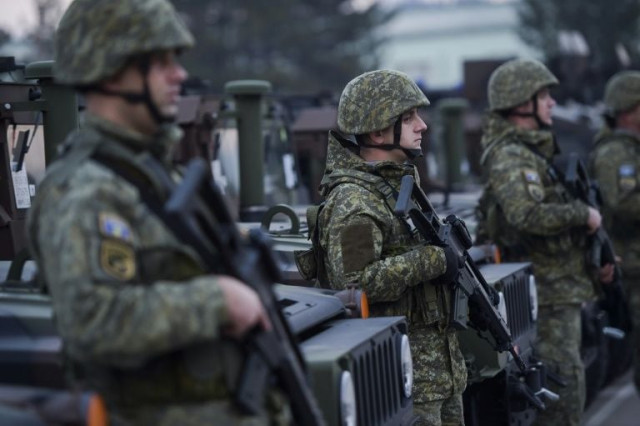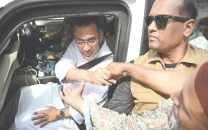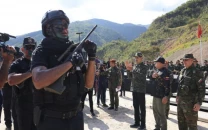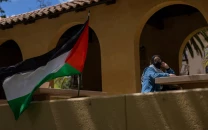Kosovo asserts statehood with vote to create army
Kosovo and Serbia struggle to make progress in faltering EU-led talks to normalise their ties

Under the new law, the Kosovo Security Force would be gradually transformed into a professional army of 5,000. PHOTO: AFP
Kosovo has been guarded by NATO-led peacekeeping troops since it broke away from Belgrade in a bloody separatist war in 1998-99.
The new laws will double the size of a small crisis-response outfit, the Kosovo Security Force (KSF), and set out a national defence mandate for a professional army of 5,000 troops.
"This vote today begins a new era for our country. From this moment we officially have the army of Kosovo," parliamentary speaker Kadri Veseli said as MPs hugged each other after the session, which was boycotted by minority Serb politicians.
The vote will delight many Kosovo Albanians, who are ready to celebrate the army as a new pillar of their independence, which was declared in 2008.
"Now we can say that we are a state, there is no a state without an army," Skender Arifi, a 37-year-old hairdresser in Pristina, told AFP ahead of the vote.
Kosovo war veterans block road to stop visit by Serbian president
While it is a mostly symbolic flaunting of Kosovo's sovereignty, Serbia — which still considers the former province a renegade territory — has castigated the move as a threat to regional stability.
Speaking after the vote, Serbia's Prime Minister Ana Brnabic said it was "a hard day," but that Serbia would "stay on its path of peace and prosperity".
In particular, Belgrade has sounded the alarm over the safety of 120,000 Serbs still living in Albanian-majority Kosovo, mainly in the north near their contested border.
Those Serb communities are loyal to Belgrade and also broadly against the army plan.
"We do not want a Kosovo army here," said Marko Djusic, a Serb resident of Dren village near the border.
"I hope that even if Albanians make some moves (against) us, the state of Serbia will do something to protect us," he added.
NATO, which has four members that do not recognise Kosovo, had warned the army move was "ill-timed" amid already strained ties between Pristina and Belgrade.
NATO chief Jens Stoltenberg said Friday the alliance will "re-examine" its role in Kosovo in light of the vote.
"NATO supports the development of the Kosovo Security Force under its current mandate. With the change of mandate, the North Atlantic Council will now have to re-examine the level of NATO's engagement with the Kosovo Security Force," he said.
But Washington — Kosovo's pre-eminent ally — voiced public support, as did the United Kingdom.
Many Kosovo roads were adorned with American flags on Thursday in a sign of gratitude.
But divided allegiances were on display in the segregated city of Mitrovica, where US flags were flown in the Albanian-dominated south while Serbian flags covered the mainly Serb north.
Kosovo farmer names one of his wolves Trump
In a statement Friday the US Embassy affirmed its support for the KSF's transition but added that Kosovo and Serbia should take "immediate steps to lower tensions" and make progress in their ongoing dialogue.
Kosovo and Serbia have struggled to make progress in faltering EU-led talks to normalise their ties — a condition for either to eventually join the bloc.
Their relationship took a serious plunge last month after Kosovo slapped a 100-per cent tariff on Serbian goods in revenge for Belgrade's attempts to undermine it on the world stage.
Serbia has blocked Kosovo from various international organisations, including the UN, and also lobbied foreign governments to revoke their recognition of its statehood.
Analysts say the army move is also partly an attempt by Kosovo's government to make up for a slew of setbacks in recent months.
In November Kosovo was crushed when the global police organisation, Interpol, rejected its application to become a member.
Another source of widespread public frustration is the lack of visa-free travel status in the European Union, which other Balkan states enjoy.
"After the failure to join Interpol and visa liberalisation, the transformation of the KSF is their only card left," said political analyst Imer Mushkolaj.
"This is why they are trying to push forward this process by any means necessary."
The new laws will keep KSF's name but change its mandate to "defence of the country", a move that allowed the government to bypass creating an army through constitutional changes, which would have required support from minority Serb MPs




1726734110-0/BeFunky-collage-(10)1726734110-0-208x130.webp)














COMMENTS
Comments are moderated and generally will be posted if they are on-topic and not abusive.
For more information, please see our Comments FAQ